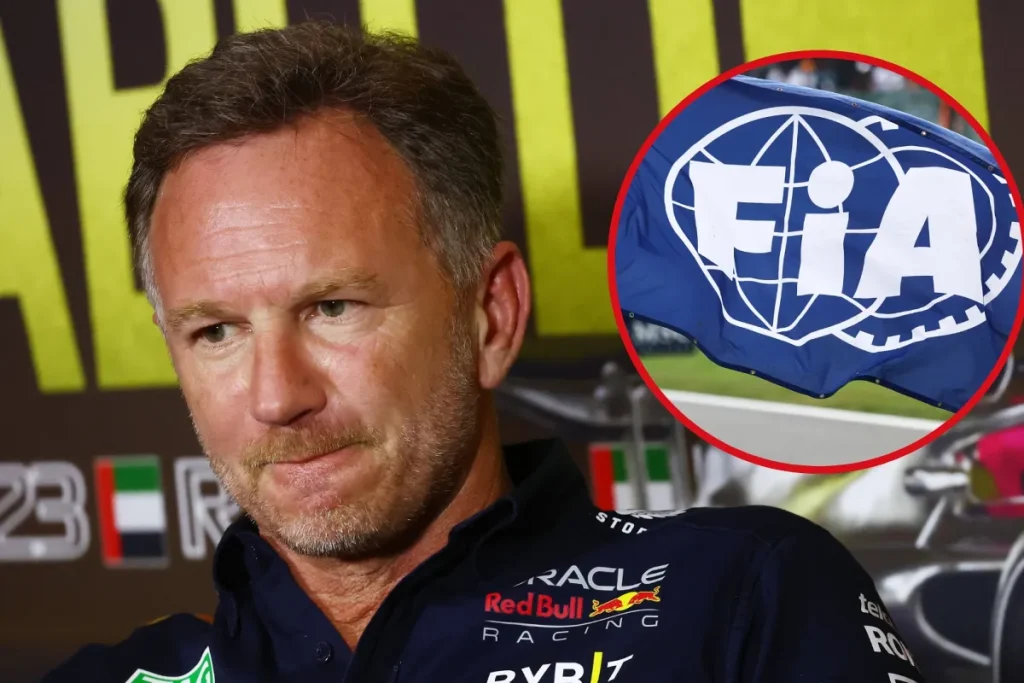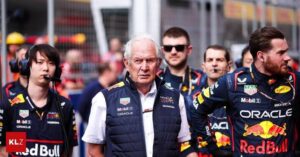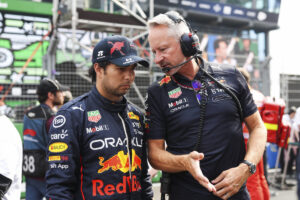SHOCKING NEWS: Christian Horner blames FIA for Red Bull downfall…..Read more

Horner Points Fingers at FIA for Red Bull’s Recent Struggles
Red Bull Racing’s Team Principal, Christian Horner, has made headlines with a bold accusation, claiming that the FIA (Fédération Internationale de l’Automobile) is responsible for Red Bull’s recent downturn in Formula 1. Horner’s remarks have ignited a heated discussion within the F1 community, as fans and experts react to the team boss’s assertion that regulatory changes have hindered Red Bull’s success.
After several seasons of dominating the sport, with Max Verstappen securing multiple World Championships and the team regularly taking the Constructors’ title, Red Bull’s recent performance has dipped. In a press conference, Horner directly blamed the FIA for this drop in form, alleging that the organization’s rule changes have unfairly targeted Red Bull.
“The FIA has clearly shifted the goalposts,” Horner said. “The changes they’ve introduced have made it incredibly difficult for us to maintain our competitive edge. We’ve been specifically affected by these moves, and it’s no coincidence that our struggles have coincided with these regulations.”
Horner’s frustration appears to stem from several regulatory updates introduced by the FIA, particularly in the areas of aerodynamics and cost cap enforcement. One of the most significant changes has been the introduction of stricter aerodynamic restrictions, which have altered the design parameters for F1 cars. These changes were intended to create a more level playing field across teams and reduce the dominance of any single team, but Horner argues that Red Bull has borne the brunt of these alterations.
In addition to aerodynamic tweaks, Horner expressed concerns about increased scrutiny on Red Bull’s spending under the cost cap regulations. He suggested that the team’s development processes and budget have been unfairly targeted by the FIA, limiting their ability to stay ahead of rivals like Mercedes and Ferrari.
According to Horner, these changes have disrupted Red Bull’s development strategy, leaving them struggling to adapt to the new rules. “The timing and nature of these regulations have disproportionately affected us,” he said, “and we’ve been left playing catch-up.”
Horner’s comments have sparked a range of reactions from within the Formula 1 community. Supporters of Red Bull have echoed his concerns, suggesting that the FIA’s regulatory changes seem designed to curb the team’s dominance and increase competition across the grid. These fans believe that Red Bull is being unfairly targeted in an effort to shake up the competitive landscape.
On the other hand, critics have pushed back, accusing Horner of deflecting blame from Red Bull’s own missteps. They argue that while the regulations have affected all teams, other competitors like Mercedes and Ferrari have faced similar challenges and are working to adapt without publicly blaming the governing body.
Former F1 driver and now commentator Martin Brundle added his perspective, saying, “Horner’s comments are likely to stir up some controversy, but this is Formula 1—we see regulations change all the time. Teams need to adjust, innovate, and move forward. If Red Bull is facing difficulties, pointing fingers won’t solve them.”
Some analysts suggest that Horner’s comments could be part of a broader strategy to put pressure on the FIA, potentially in an effort to lobby for future regulatory adjustments. However, others view this as an attempt to rally the Red Bull team and motivate them amid a challenging phase of the season.
The FIA has yet to issue a formal response to Horner’s claims, though insiders have reportedly dismissed the accusations as baseless. According to sources within the organization, the recent rule changes were implemented as part of a broader strategy to enhance competition and ensure the long-term sustainability of the sport, rather than targeting any specific team.
This is not the first time Red Bull has found itself at odds with the FIA. Past disagreements have occurred over technical directives, penalties, and even issues as minor as track limits. However, Horner’s latest remarks seem to indicate a deepening rift between Red Bull and the governing body, one that could have far-reaching consequences for the team’s strategy and relationship with the sport’s officials.
As the Formula 1 season progresses, Red Bull faces a critical juncture. With their rivals showing signs of improvement, Horner’s team must navigate these regulatory challenges and find a way to regain their competitive edge. Whether Red Bull can rise to the occasion or continue to struggle under the new rules remains to be seen.
Christian Horner’s public criticism of the FIA has added another layer of drama to an already intense F1 season. His suggestion that Red Bull is being unfairly targeted raises important questions about the balance between competition and regulation in Formula 1. As the debate continues to unfold, all eyes will be on Red Bull to see how they adapt and whether the team can reclaim its position at the top of the sport.
In the end, Horner’s remarks may serve as a rallying cry for his team, but they have also put the spotlight on the FIA’s role in shaping the future of F1. With the stakes higher than ever, Red Bull’s next moves will be critical in determining whether they can overcome this “downfall.”








